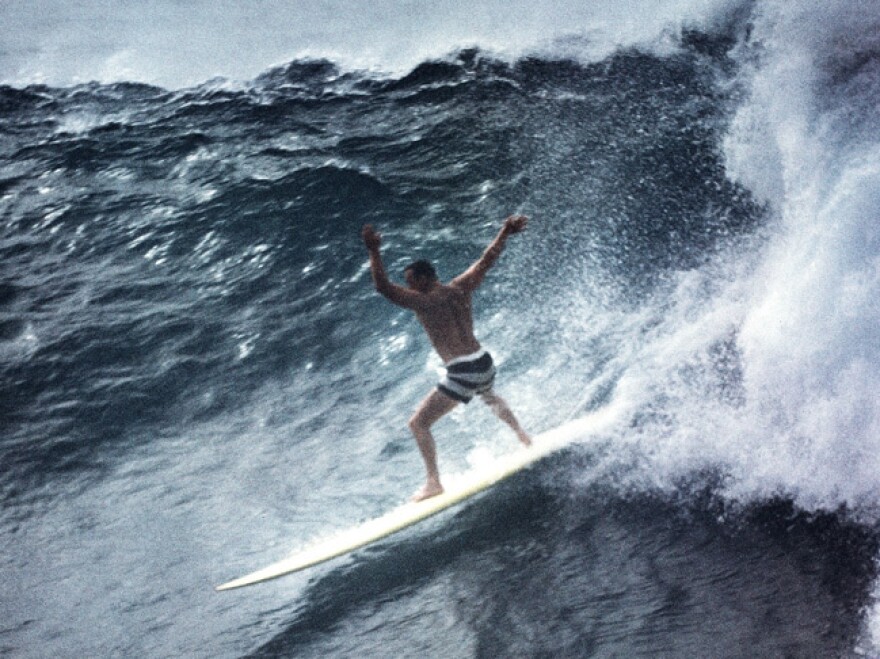Don Waters was 3 when his father, Robert Stanley Waters, abandoned the boy and his mother. But before Robert Waters died, he sent Don a short autobiography, hoping it would help him understand his father.
It took years before Don could bring himself to read it. When he did, he discovered an unsuspected past — and a shared passion for surfing. What he read prompted him to take a trip along the California coast, where his father played a part in establishing the surfer culture's first beachhead on the American mainland.
Don Waters wrote about his experience for Outside magazine, and talks with NPR's Neal Conan about the surprising things he learned, chasing down his father through surfing history.
Interview Highlights
On receiving the memoir from his estranged father
"After our third meeting, he was very excited to have me back in his life, and he knew I was a writer, and so he sat down, and he penned his memoir. And then he finally sent it to me, and I didn't know what to do with it. And so I shoved it into a drawer. ... I was terrified.
"And so I finally opened it after six years, after my father's father died. And I realized I was the last Waters man in line, and I wanted to know more about my past. It was something that I'd just not been thinking about. And so finally I read it. And I opened it, and I was completely mesmerized. ... It really just took me a long time simply because of anger and issues that I was having to deal with, with our relationship and our disconnect.
"And so one of the reasons I took on this journey was to, you know, get rid of some of that anger. I think my father had a lot of anger in his life, and he had some anger with my mother, and, you know, in the end, that's a terrible thing, and I just didn't want to hold onto that like he did. And so I took this journey, and I'm really glad that I did."
On Robert Waters' secret life on the California coast
"There are amazing tales of, you know, being at the forefront of the surfing movement and hanging around some of the icons of the day and surfing some of the most amazing breaks in California, and sailing aboard yachts in races all over the place, and to Hawaii and Mexico. And not only that, being a torpedo man on a submarine in the Navy.
"So I really connected with that, and I connected with his love of water. And we both love water and the sport of surfing, and it was something that was a bridge to make me sort of get to know him better. I could actually go and surf and hopefully find some connection to something he loved and by doing that, you know, create my own positive memories of the man."

On tracking down iconic big-wave surfer Greg Noll
"My father grew up a couple blocks away from Greg Noll. So my father knew Greg Noll, and Greg Noll gave my father his first balsa wood surfboard. ... And so I tracked down Greg and his son Jed, who are both lovely people, but it really took some convincing to allow me to go to their shop at Greg's house in Northern California and shape a surfboard with them. And it was really amazing, too, because I was able to see the interaction of Greg and his son Jed and their interaction with each other. ... It's really lovely to witness. ...
"I've always felt jealous about men who follow in their father's footsteps, and Jed, you know, really respects his father, and he's doing the same thing. He now has his own shop in San Clemente. But, so, what we did is we shaped the same board, it's called a Malibu chip, and made out of the same balsa wood, not the same balsa wood, but, you know, different sticks of balsa wood. ...
"And then I took the board, and I went to the beach, Manhattan Beach, where my father first surfed, and I paddled into the waves there. ... I was terrified, because these boards, really, they retail for a lot of money ... and they're works of art. And so then, you know, there I am out at the beach with all these other surfers, and I've got this really expensive board. ... But I did OK, and I caught some waves, and it was really wonderful."
Copyright 2020 NPR. To see more, visit https://www.npr.org.



